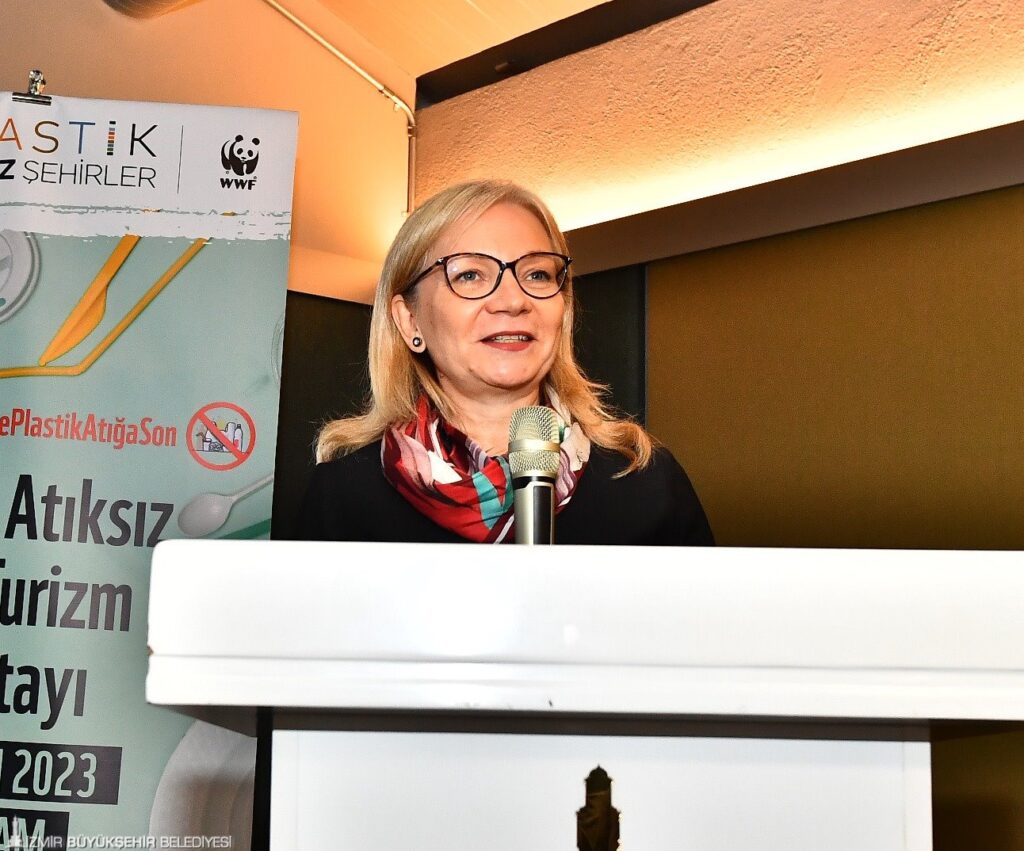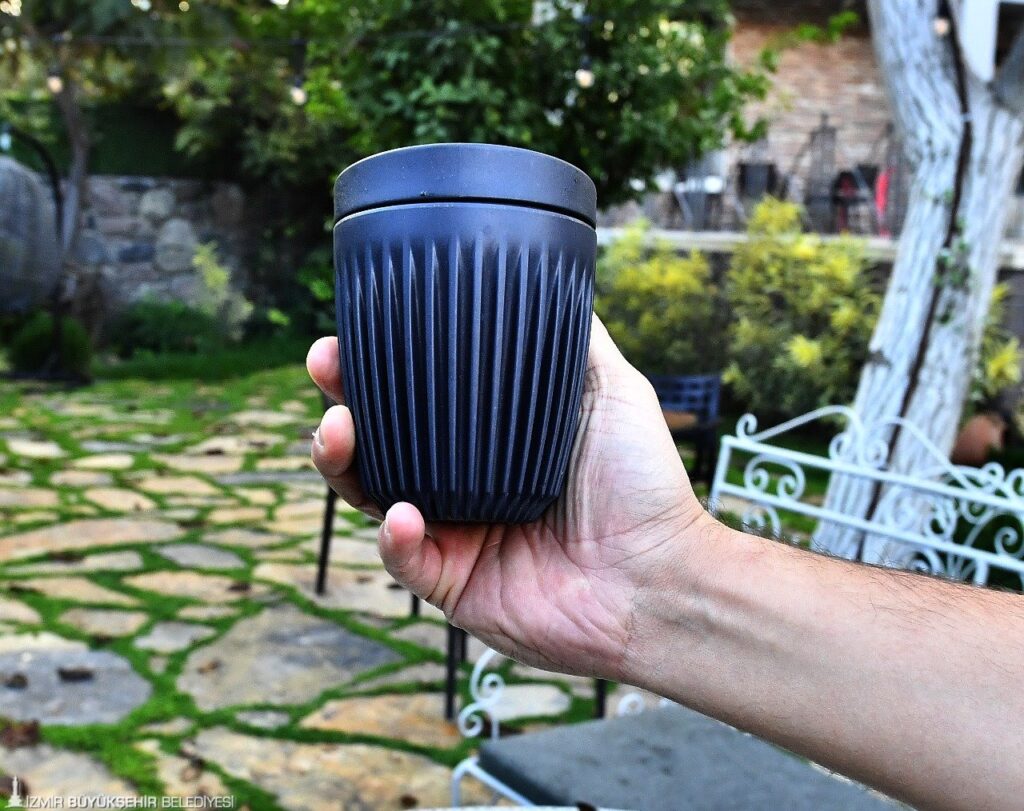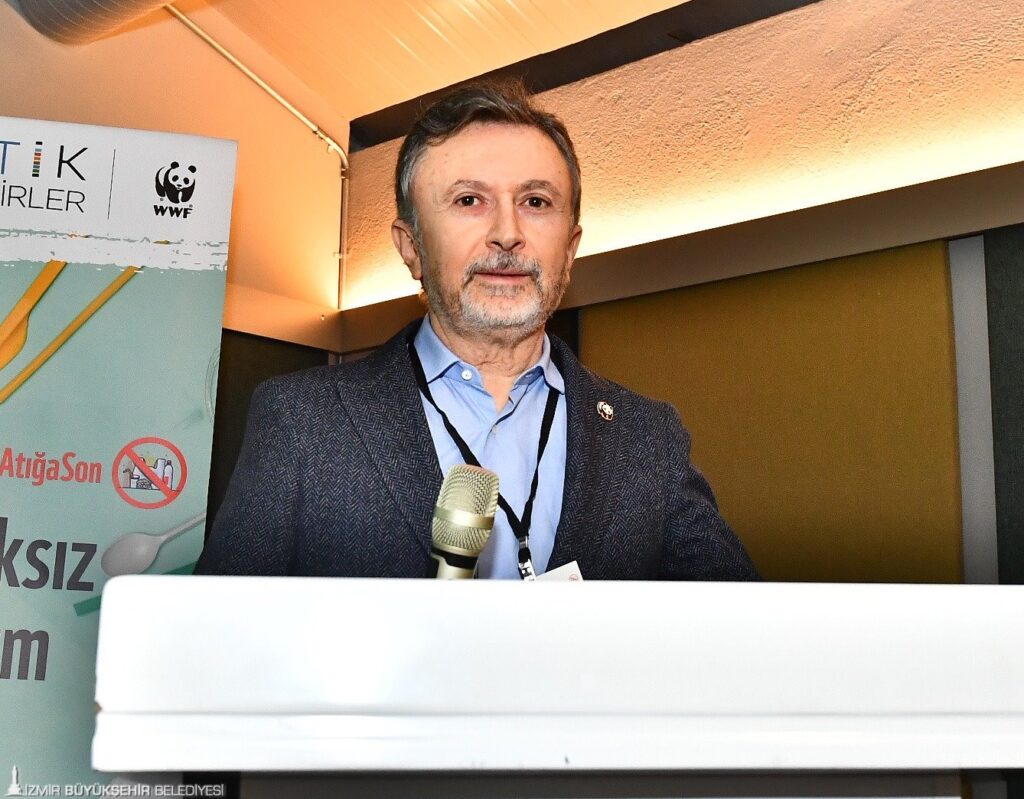The Plastic Smart Izmir Tourism Workshop was held in Urladam, Izmir within the scope of the 15th European Waste Reduction Week held between 18 to 26 November 2023.
With the slogan “End plastic waste in tourism“, the Plastic Smart Izmir Tourism Workshop was co-organised by the Izmir Metropolitan Municipality’s Climate Change and Zero Waste Department and WWF-Turkey. Attended by 64 participants from regional municipalities, NGOs, government offices, hotels, and tourism union representatives, the workshop provided a chance for stakeholder collaboration and coordination, especially among municipalities and the tourism sector.
“We want to be a model and make Izmir a model,” said Şükran Nurlu, Deputy Secretary General of Izmir Metropolitan Municipality, in her opening speech at the workshop.
In 2019, Izmir became the second city to join Plastic Smart Cities in the Mediterranean region when the Mayor signed a Declaration of Intent, demonstrating its pioneering commitment to achieving no plastic leakage in nature.
Boasting 629 kilometers of coastline, Izmir is Turkey’s third largest city and an increasingly popular destination for nature and heritage tourism. Yet, each kilometer of its coast is estimated to receive 7.2 kg of plastic debris every day, more than the 5 kg average in the Mediterranean1.
Cities at the Forefront of Plastic Pollution – and Solutions

“Plastics are among the indispensable today, as they are easy to use and highly adaptable to fast-paced city life. Half of the world’s population lives in cities and half in rural areas. However, by 2050, 70 percent of this population is expected to live in cities and 30 percent in rural areas. If we are talking about protecting nature and preventing the effects of climate change, we have to start with plastic solutions from urban areas,” Nurlu said.
In 2021, Izmir developed a City Action Plan with support from WWF-Turkey. This has been updated in 2022 based on results from its pilot project in the district of Çeşme, where a detailed waste analysis was carried out.
The highlights of the City Action Plan prepared by Çeşme are as follows:
- Banning single-use plastics at the Municipality of Çeşme’s buildings and restaurants & cafes owned by Çeşme Municipality (6 restaurants/cafes),
- Banning single-use plastics in organizations and public events sponsored by Çeşme Municipality,
- Promoting gradual transition to use paper bags instead of plastic bags used in local marketplaces,
- Increasing the numbers of mobile waste collection centers to enhance waste segregation at source,
- Supporting cooperation with the local business towards Plastic Smart Çeşme,
- Organizing waste collection activities with the local citizens to create public awareness,
- Preparing a comprehensive Communication Plan. All the work included in the Action Plan will be transparently shared with the public.
Discussions from the workshop focused on prevention, alternatives and substitutes to plastic, collection and separation at source as well as increasing awareness – especially in the context of tourism and hospitality – with outputs aimed at strengthening Izmir’s Plastic Smart City Action Plan.
At a side session, representatives from the hospitality sector were asked to vote for the ease of reducibility of single-use plastic items commonly used by hotels. The top 3 items voted for were:
- Single-use cups (cardboard & plastic),
- Plastic cutlery and plastic containing cutlery packages,
- Single-use shampoo, soap packages (vs. multi-use dispensers)

At the workshop, participants were served coffee in a mug made of durable organic coffee husks and designed to be dishwasher-safe, while cold sandwiches were served with reusable natural wax fabrics instead of single-use cling wrap plastic.
Izmir’s Sustainability Standard: No Single-Use Plastic at Tourism Hotspots
The Turkey Tourism Promotion and Development Agency presented The Sustainability Standard about single-use plastic prevention and recycling at source, which will be mandatory for all tourist hotspots starting in 2024.
Citing the prevalent use of disposable and single-use containers in beverage sales and consumption, Nurlu also emphasised the need for alternatives such as reusable mugs and bottles to be more widespread and common, “If we can revise our way of life by considering nature and give priority to nature, we can get closer to the solution.”

Addressing the workshop participants, Conservation Director of WWF-Turkey, Sedat Kalem, warned of the alarming increase in the amount of plastic waste that continues to leak into our oceans each year, “It was 8 million tonnes in 2018. Now it has exceeded 20 million tonnes. Approximately 80 percent of plastic waste in the seas is land-based. With plastic production expected to more than double by 2040, and marine plastic pollution projected to triple, we are looking to cities to step up and prevent further plastic waste from entering nature by 2030.”
Izmir for Better Tourism: End Plastic Pollution through Prevention and Proper Collection
One of the most discussed action points was about how the demand for increased hygiene due to habits formed during the pandemic had again normalised a preference for single-use plastics. However, it is critical to reduce and eliminate the use of unnecessary and high-risk single-use plastics like water bottles, shampoo sachets and other items that are usually given free-of-charge in the hospitality sector.
“It is very important to continue this process and investments initiated in Izmir with determination and to effectively implement the action plan prepared to become a Plastic Waste Free City. Izmir and the tourism sector can be the champion of the solution. The fruit of this success will be worth the effort,” Kalem said.


